Over three thousand people are estimated to have marched in support of reparations for Maafa (African enslavement) following a successful organising campaign led by grassroots activists and campaigners. Planning behind the movement was facilitated by a committed core of organisational leaders, workers and activists who utilised community radio, social media, mobile phone platforms like Whatsapp and face to face networking at various planning events.
The coalition which included both stalwarts like Bro Kwaku Bonsu, Jah B and the next generation of young leaders like Sis Toyah and Bro Xtra have been praised by many for working hard to successfully attract a large intergenerational presence alongside the community drummers, healers and activists usually involved. Marchers included those in wheelchairs, those with children on shoulders, parents with buggies, writers, musicians, educators and several noted media personalities from the world of music and sport.
The increase in the number of participants from 2014’s march led to the phrase “Were you here last year?” becoming an unofficial greeting with many expressing the view that the annual event is on route to replacing the increasingly hedonistic Notting Hill Carnival as the prime, national community gathering of positivity, cultural expression and political activity for African people in the UK.
Speaking with Bro Aboo Jahtata on Pan African community radio GalaxyAfiwe, the community organiser and youth co-ordinator Sista Natoyah said “we want more children, more people under 25, we are planning to organise education workshops on reparations across the UK… we have to keep the momentum going, keep the fire burning”
The initial gathering occurred at Windrush Square outside the iconic Black Cultural Archives building where several hundred people amassed at a warm up rally outlining the aims of the day. As coaches arrived from across the country bringing delegates from regions like Bristol and Birmingham the numbers swelled. By midday the marching had begun and as the group left the Brixton area, the hundreds of walkers morphed into thousands as passer-by’s parked their cars, left homes and shops to support the single unified call for reparations.
Globally, the entire day was filled with activities around emancipation and remembrance. The annual African Remembrance Day event founded by Onyekachi and Chidiwere Wambu in 1995 celebrated its 20th anniversary at the Museum of London Docklands. Simultaneously across the Caribbean there were gatherings in regions such as Barbados where families marched in remembrance of their African ancestors alongside commentary from historians Morris Greenidge and Trevor Marshall.
In London, hundreds left the march as they approached Kennington Park to participate in an educational rally on the topic of reparations. The thousand drum rally which was organised by Rastafari Movement UK (RMUK) offered respite for elders and those with very young children who felt unable to make the entire walk to parliament.
As the bulk of the marchers approached Parliament a pause was called as attempts were made to unify everyone behind a single banner. Meanwhile a group of supporters who attended the march last year came across Westminster Bridge and walked up to a tepid police barricade where it had allegedly been agreed that only six people could pass to hand the petition to Downing Street.
With the police in the middle of the small group of supporters already past the barricade and the several thousand behind it, a collective decision seemed to be made to move on and the marchers walked around the police van and plastic cones blocking the route and congregated in a joyous and celebratory manner at Parliament Square where members of the ‘laughing gas protest’ looked on in amazement. There a peaceful rally took place as the movement sat on the grass, engaged in political reasoning and social networking whilst children played in the sun.
A delegation of community representatives including Sis Jendayi Serwah, Sis Esther Stanford-Xosei, Mama Lindiwe Tsele, Sis Natoya Smith and brothers Kweme Abubaka and Jabari Sekou handed in the petition ‘Stop the Maangamizi: We Charge Genocide/Ecocide’ requesting an All-Party Commission of Inquiry for Truth & Reparatory Justice to Downing Street.
After congregating at Parliament Qquare the marchers returned to Brixton where work promoting this year’s theme ‘Education is the preparation for Reparation’ continued. Speaking about the success of the event on Powerxtra radio, Bro Kwaku Bonsu said “[The reparations march is] about galvanising our people, it’s not simply annual, it’s futuristic, this is something we will leave with our children for their children’s children to continue.”
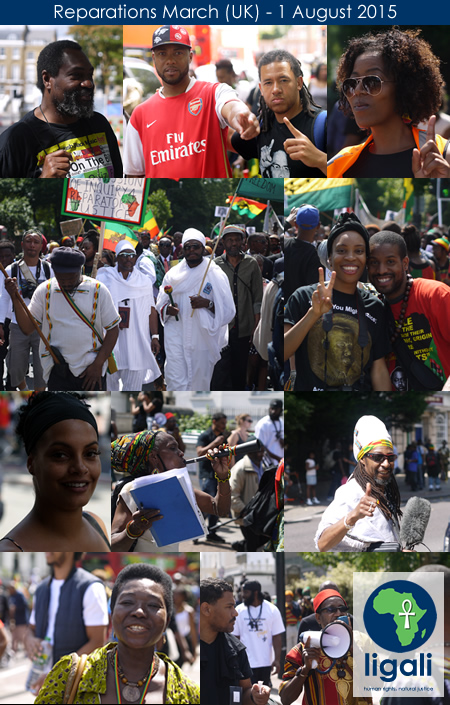
Despite there being no significant coverage of the reparations march by the mainstream British media, community photos and video of the event were omnipresent across social network platforms like Facebook, Twitter and Whatsapp. Public broadcasters BBC and Channel 4 deliberately ignored the thousands of African people congregated in parliament square and chose only to cover the story of the ‘Laughing gas protest’ where an estimated 60-80 people gathered to inhale nitrous oxide in protest of the governments proposed Psychoactive Substances Bill laws.
In 2014 the Ligali organisation raised an official complaint on the matter. The BBC responded stating;
“I understand you feel there has been no coverage of the Reparations March in London on the 1st August 2014… We know not everyone will agree with our choices on which stories to cover, and the prominence we give to them. These are subjective decisions made by our news editors, and we accept not everyone will think we’re correct on each occasion.”
Bro Kwaku Bonsu said “Stop paying the BBC license, we pay their license and they didn’t cover the event, they have total contempt for us, they even have black people on their radio stations and they still didn’t send anyone to cover it”.
Despite the best efforts of the British government and media to marginalise discussions on justice for African people whilst conflating the issues of reparations with compensation, a grass roots community education program has managed to enlighten many about its holistic nature around the theme of repair.
The topic of reparations has dominated 2015 and not all of it is Maafa related. The Indian MP Shashi Tharoor caused a storm on social media when he successfully argued Britain ‘owed’ reparations to India during a debate at Oxford Union. In April the Greek government threatened to seize £204bn in German property as reparation for Nazi war crimes. Yet despite the recent broadcasting of ‘Britain's Forgotten Slave Owners’ by the BBC where presenter David Olusoga revealed that almost £17bn in today’s money was paid in compensation to Britain’s slavers, the British government is adamant it will not reparate for its leading role in Maafa where African people across the world were kidnapped, raped, exploited and murdered under its barbaric system of Transatlantic enslavement and colonial enslavement.
Toyin Agbetu is another of many activists calling for reparations in the form of justice. The Change.org petition started by Ligali and directed at Alison Saunders, Director of Public Prosecutions is asking for the public to support a campaign to ‘Help Bring Maafa War Criminals to Justice’. The petition seeks to secure criminal prosecutions of Britons responsible for atrocities in Kenya during 1950 -1963.
This has come after a two year investigation by the police which was recently closed down by the CPS who refused to prosecute any of the British colonial officers guilty of rape, torture, enslavement and murder. Testimony from Kenyans witnesses and evidence in books from academics Caroline Elkins (2005) and David Anderson (2005) reveals much detail of what occurred at the time. One of the interviews with the suspects read;
“Things got a little out of hand. By the time I cut his balls off, he had no ears, and his eyeball, the right one, I think, was hanging out of its socket. Too bad, he died before we got much out of him.”
Despite testimony such as this and thousands of pieces of evidence, the Crown Prosecution Service has stopped the investigation from proceeding. Toyin asks that those who want to know what to do next get involved. He said “Sign petitions, make donations, support community groups and organisations working in education, employment, health and politics. Reparations starts with the essential act of self-reparation. It is only by sharing the work amongst many shoulders we can achieve a truly holistic vision of reparations that effectively tackles political injustice, social injustice, economic injustice and crimes of a spiritual nature.”
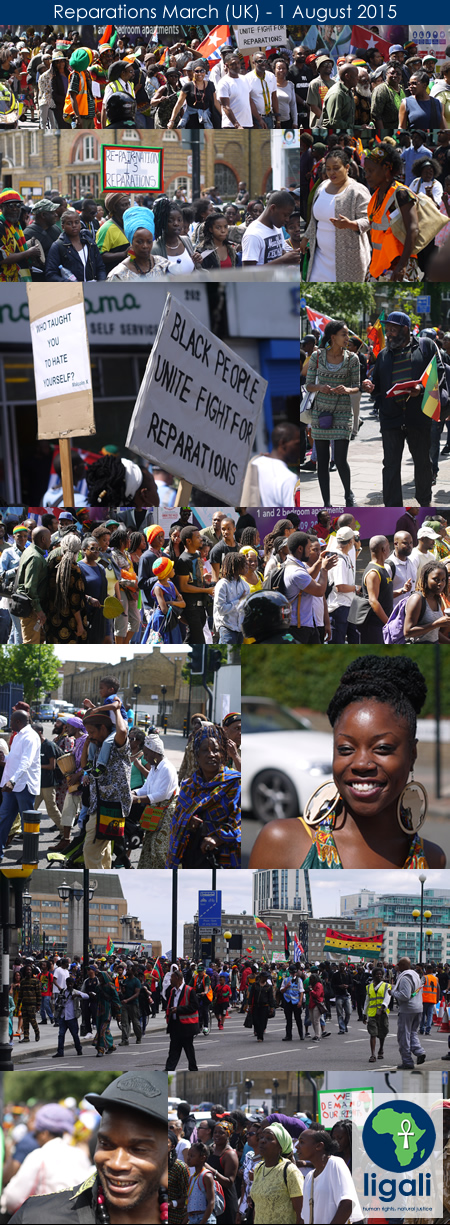
External Links
Petition: Bring Maafa War Criminals to JusticeDoes Germany owe Greece wartime reparations money?Should the UK pay reparations to India?The March - August 2015Emancipation walk on Saturday
RMT commended for hosting Reparations Education SchoolThousands of Africans unite for Reparations March 2014
The coalition which included both stalwarts like Bro Kwaku Bonsu, Jah B and the next generation of young leaders like Sis Toyah and Bro Xtra have been praised by many for working hard to successfully attract a large intergenerational presence alongside the community drummers, healers and activists usually involved. Marchers included those in wheelchairs, those with children on shoulders, parents with buggies, writers, musicians, educators and several noted media personalities from the world of music and sport.
The increase in the number of participants from 2014’s march led to the phrase “Were you here last year?” becoming an unofficial greeting with many expressing the view that the annual event is on route to replacing the increasingly hedonistic Notting Hill Carnival as the prime, national community gathering of positivity, cultural expression and political activity for African people in the UK.
Speaking with Bro Aboo Jahtata on Pan African community radio GalaxyAfiwe, the community organiser and youth co-ordinator Sista Natoyah said “we want more children, more people under 25, we are planning to organise education workshops on reparations across the UK… we have to keep the momentum going, keep the fire burning”
The initial gathering occurred at Windrush Square outside the iconic Black Cultural Archives building where several hundred people amassed at a warm up rally outlining the aims of the day. As coaches arrived from across the country bringing delegates from regions like Bristol and Birmingham the numbers swelled. By midday the marching had begun and as the group left the Brixton area, the hundreds of walkers morphed into thousands as passer-by’s parked their cars, left homes and shops to support the single unified call for reparations.
Globally, the entire day was filled with activities around emancipation and remembrance. The annual African Remembrance Day event founded by Onyekachi and Chidiwere Wambu in 1995 celebrated its 20th anniversary at the Museum of London Docklands. Simultaneously across the Caribbean there were gatherings in regions such as Barbados where families marched in remembrance of their African ancestors alongside commentary from historians Morris Greenidge and Trevor Marshall.
In London, hundreds left the march as they approached Kennington Park to participate in an educational rally on the topic of reparations. The thousand drum rally which was organised by Rastafari Movement UK (RMUK) offered respite for elders and those with very young children who felt unable to make the entire walk to parliament.
As the bulk of the marchers approached Parliament a pause was called as attempts were made to unify everyone behind a single banner. Meanwhile a group of supporters who attended the march last year came across Westminster Bridge and walked up to a tepid police barricade where it had allegedly been agreed that only six people could pass to hand the petition to Downing Street.
With the police in the middle of the small group of supporters already past the barricade and the several thousand behind it, a collective decision seemed to be made to move on and the marchers walked around the police van and plastic cones blocking the route and congregated in a joyous and celebratory manner at Parliament Square where members of the ‘laughing gas protest’ looked on in amazement. There a peaceful rally took place as the movement sat on the grass, engaged in political reasoning and social networking whilst children played in the sun.
A delegation of community representatives including Sis Jendayi Serwah, Sis Esther Stanford-Xosei, Mama Lindiwe Tsele, Sis Natoya Smith and brothers Kweme Abubaka and Jabari Sekou handed in the petition ‘Stop the Maangamizi: We Charge Genocide/Ecocide’ requesting an All-Party Commission of Inquiry for Truth & Reparatory Justice to Downing Street.
After congregating at Parliament Qquare the marchers returned to Brixton where work promoting this year’s theme ‘Education is the preparation for Reparation’ continued. Speaking about the success of the event on Powerxtra radio, Bro Kwaku Bonsu said “[The reparations march is] about galvanising our people, it’s not simply annual, it’s futuristic, this is something we will leave with our children for their children’s children to continue.”

Reparations March - 2015
Reparatory Justice
Despite there being no significant coverage of the reparations march by the mainstream British media, community photos and video of the event were omnipresent across social network platforms like Facebook, Twitter and Whatsapp. Public broadcasters BBC and Channel 4 deliberately ignored the thousands of African people congregated in parliament square and chose only to cover the story of the ‘Laughing gas protest’ where an estimated 60-80 people gathered to inhale nitrous oxide in protest of the governments proposed Psychoactive Substances Bill laws. In 2014 the Ligali organisation raised an official complaint on the matter. The BBC responded stating;
“I understand you feel there has been no coverage of the Reparations March in London on the 1st August 2014… We know not everyone will agree with our choices on which stories to cover, and the prominence we give to them. These are subjective decisions made by our news editors, and we accept not everyone will think we’re correct on each occasion.”
Bro Kwaku Bonsu said “Stop paying the BBC license, we pay their license and they didn’t cover the event, they have total contempt for us, they even have black people on their radio stations and they still didn’t send anyone to cover it”.
Despite the best efforts of the British government and media to marginalise discussions on justice for African people whilst conflating the issues of reparations with compensation, a grass roots community education program has managed to enlighten many about its holistic nature around the theme of repair.
The topic of reparations has dominated 2015 and not all of it is Maafa related. The Indian MP Shashi Tharoor caused a storm on social media when he successfully argued Britain ‘owed’ reparations to India during a debate at Oxford Union. In April the Greek government threatened to seize £204bn in German property as reparation for Nazi war crimes. Yet despite the recent broadcasting of ‘Britain's Forgotten Slave Owners’ by the BBC where presenter David Olusoga revealed that almost £17bn in today’s money was paid in compensation to Britain’s slavers, the British government is adamant it will not reparate for its leading role in Maafa where African people across the world were kidnapped, raped, exploited and murdered under its barbaric system of Transatlantic enslavement and colonial enslavement.
Toyin Agbetu is another of many activists calling for reparations in the form of justice. The Change.org petition started by Ligali and directed at Alison Saunders, Director of Public Prosecutions is asking for the public to support a campaign to ‘Help Bring Maafa War Criminals to Justice’. The petition seeks to secure criminal prosecutions of Britons responsible for atrocities in Kenya during 1950 -1963.
This has come after a two year investigation by the police which was recently closed down by the CPS who refused to prosecute any of the British colonial officers guilty of rape, torture, enslavement and murder. Testimony from Kenyans witnesses and evidence in books from academics Caroline Elkins (2005) and David Anderson (2005) reveals much detail of what occurred at the time. One of the interviews with the suspects read;
“Things got a little out of hand. By the time I cut his balls off, he had no ears, and his eyeball, the right one, I think, was hanging out of its socket. Too bad, he died before we got much out of him.”
Despite testimony such as this and thousands of pieces of evidence, the Crown Prosecution Service has stopped the investigation from proceeding. Toyin asks that those who want to know what to do next get involved. He said “Sign petitions, make donations, support community groups and organisations working in education, employment, health and politics. Reparations starts with the essential act of self-reparation. It is only by sharing the work amongst many shoulders we can achieve a truly holistic vision of reparations that effectively tackles political injustice, social injustice, economic injustice and crimes of a spiritual nature.”

Reparations March - 2015
External Links
Petition: Bring Maafa War Criminals to JusticeDoes Germany owe Greece wartime reparations money?Should the UK pay reparations to India?The March - August 2015Emancipation walk on Saturday
Ligali is not responsible for the content of third party sites
RMT commended for hosting Reparations Education SchoolThousands of Africans unite for Reparations March 2014
Speak Out!
Did you attend this year’s reparations march or one of the many supporting events? If so how was it for you? Will you be encouraging others to go next year?Click here to speak out or read (4) comments about this article
Much debate and coverage of the reparations march has been shared across Facebook and Twitter following the deliberately marginalisation by the media of the thousands of African people congregated in parliament square.
See Related:
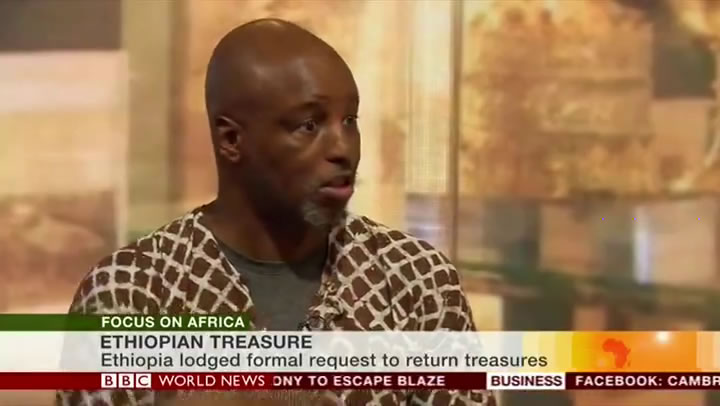
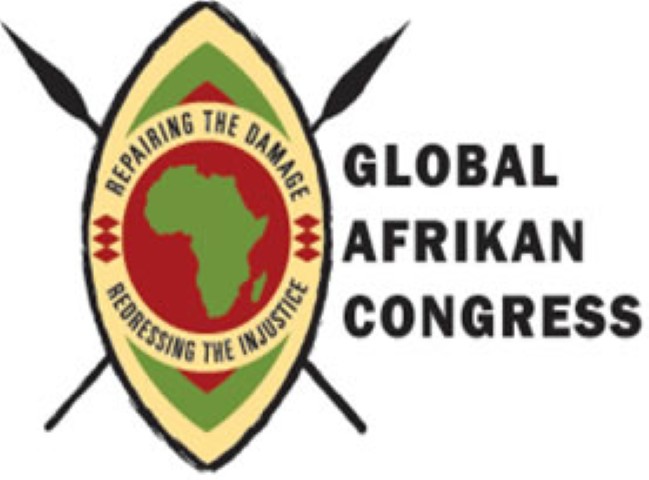
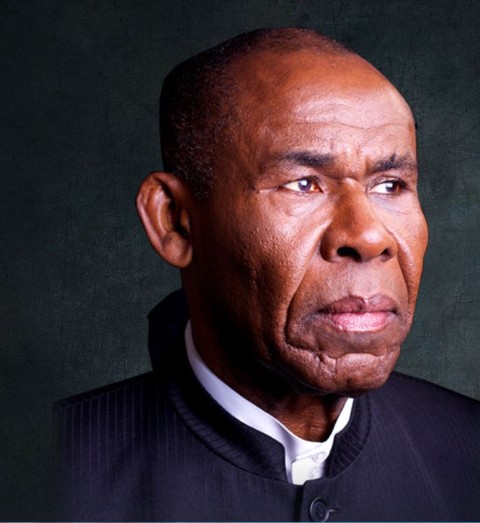
Get involved and help change our world